Beyond Power and Resistance
Beyond Power and Resistance
Politics at the Radical Limits
Peter Bloom
London New York
Published by Rowman & Littlefield International, Ltd.
Unit A, Whitacre Mews, 26-34 Stannary Street, London SE11 4AB
www.rowmaninternational.com
Rowman & Littlefield International, Ltd. is an affiliate of Rowman & Littlefield
4501 Forbes Boulevard, Suite 200, Lanham, Maryland 20706, USA
With additional offices in Boulder, New York, Toronto (Canada), and Plymouth (UK)
www.rowman.com
Copyright 2017 by Peter Bloom
All rights reserved . No part of this book may be reproduced in any form or by any electronic or mechanical means, including information storage and retrieval systems, without written permission from the publisher, except by a reviewer who may quote passages in a review.
British Library Cataloguing in Publication Data
A catalogue record for this book is available from the British Library
ISBN: HB 978-1-78348-753-0
PB 978-1-78348-754-7
Library of Congress Cataloging-in-Publication Data
Names: Bloom, Peter (Social science teacher), author.
Title: Beyond power and resistance : politics at the radical limits / Peter Bloom.
Description: London ; New York : Rowman & Littlefield International, Ltd, [2017] | Includes bibliographical references and index.
Identifiers: LCCN 2016029614 (print) | LCCN 2016045942 (ebook) | ISBN 9781783487530 (cloth : alk. paper) | ISBN 9781783487547 (pbk. : alk. paper) | ISBN 9781783487554 (electronic)
Subjects: LCSH: Power (Social sciences) | Protest movements. | Government, Resistance to. | Social changePolitical aspects.
Classification: LCC HN49.P6 B56 2017 (print) | LCC HN49.P6 (ebook) | DDC 303.3dc23
LC record available at https://lccn.loc.gov/2016029614

The paper used in this publication meets the minimum requirements of American National Standard for Information SciencesPermanence of Paper for Printed Library Materials, ANSI/NISO Z39.48-1992.
Printed in the United States of America
This book is dedicated to Sara, whose love and support makes everything else possible
Contents
This book was the result of a long and shared effort to rethink the potential of radical politics. More precisely, it was borne out of a desire to transform change from a project of resistance to one of possibility. My inspiration to become a scholar was principally to change the world. However, what began as a means to simply challenge the system has in practice been an exciting journey of discovering how collectively it is possible to creatively transform our reality. I am deeply grateful for all the people who have influenced me and supported me on this ongoing journey.
I would like to especially thank all the friends and teachers at Goucher College who opened me up to new ways of thinking and living as an undergraduate. In particular, I cannot even begin to express my gratitude and appreciation for the early encouragement of Dr Steve DeCaroli, Professor John Rose, Dr George Baca and Professor Joe Morton. They planted the seeds of my critical perspective all flaws in what was produced are entirely my own.
I would like also to give special thanks to the Ideology and Discourse Analysis programme at the University of Essex where I completed my postgraduate studies. I was so fortunate to experience the openness, joy, growth and excitement of being part of community dedicated to radical friendship with an ethos of revolutionary hospitality to each other. I have been furthermore fortunate to experience this sense of supportive community twice more first as a member of the People, Organisation and Work Research Group at Swansea University and currently as part of the Department of People and Organisation at the Open University.
I am additionally grateful beyond measure to the friends and colleagues who have been so fundamental to shaping the ideas and insights that inspired this book. My eternal gratitude to Dr Pasi Ahonen and Dr Mrinalini Greedharry, not only for their valuable intellectual insights which are considerable but more importantly for showing me that it is always possible to do otherwise. My deep thanks to Dr Sam Dallyn, who has been a critical intellectual partner and friend since literally my first day in the UK over a decade ago. My sincere thanks as well to Dr Leonidas Karakatsanis, whose work, conversation and friendship has revealed how rewarding and radical a genuine openness to possibility can be. I would additionally like to thank Professor Carl Rhodes, Professor Alison Pullen, Professor Peter Case, Professor David Knights, Professor Alessia Contu, Professor David Howarth, Professor David Wilson, Professor Albert Weale, Dr Jason Glynos, Dr Cinzia Priola, Dr Diannah Lowry, Dr Diane Preston, Dr Carl Cederstrom and Dr Paul White for their intellectual and personal contributions to my thinking and development. Also thanks to all those at Rowman & Littlefield International who believed and supported the publication of this book particularly Anna Reeve and Michael Watson.
This book could not have been written without the love and support of my family. Words cannot begin to describe my appreciation for my parents Martin Bloom, Sarah Cowan Bane, Phyllis Bloom and Fred Bane, my brothers Justin Golden and Jay Baur as well as Mallory Powers, Meghan Powers, Roger Powers and Josephine Powers. I am sincerely grateful for my sister and best friend Jane Bloom Baur, whose adventurous spirit inspires me every day. I am further grateful to my partner Sara Gorgonis family Marcello Gorgoni, Maria-Rosaria Stabili, Barbara Gorgoni, Charlie Abel, Marco Abel (sorry about the rubbish book title), Daniel Abel, Luca Scholz and Jan Scholz.
Additionally, I am truly indebted to all my friends, including my family Nikos Dipsis, Victoria Dipsis, Leon Dipsis and Alex Dipsis along with Chris Ratke, Angella Bellotta, Gideon Ratke, Nicholas Watts, Jennifer Miller Watts, Kayla Miller Watts, Bastian Miller Watts, Raymond Gaston, Jean Ryoo, Denzel Gaston, Will Starr, Justin Resti, Deborah Savage, Kristi Winters, John Stanbro, Kathleen Stanbro, Luke Stanbro and Rory Stanbro. Finally, this book is dedicated to my partner, Sara Gorgoni.
The very existence of power and resistance often seem to be universal. They are thought to be timeless elements in the creation and recreation of society. It is commonly assumed that just as there have always been forces of coercion and authority, there has also always been opposition to such power. If this relationship does not define every life, it certainly seems to be the motor of generational change and societal evolution. To quote Foucault, There is no power without resistance. Echoing these sentiments more poetically, Margaret Atwood declares, I believe in the resistance as I believe there can be no light without shadow; or rather, no shadow unless there is also light.
This logic is both rationally persuasive and emotionally resonant. It tells a familiar story of human affairs where even the greatest empires ultimately fall and where glory always fades. In which the dreams of progress are delivered through the sweat and blood of popular movements. Despite its common sense and romance, it is profoundly deceptive. It makes natural what is socially constructive, and makes universal what is localized to a time and place in human history. This is not to say that resistance is all together new. However, it is to make clear that its dominance as a way for making sense of ourselves, our world and our ability to change it certainly is.

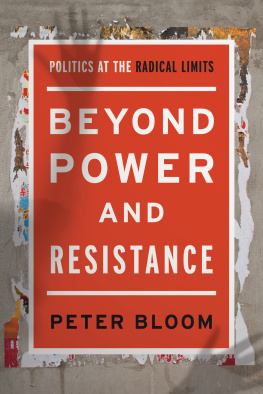

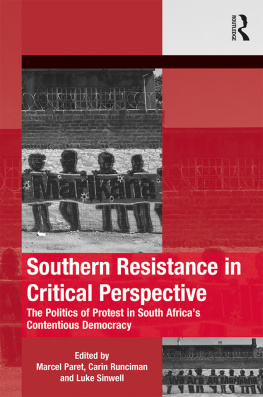

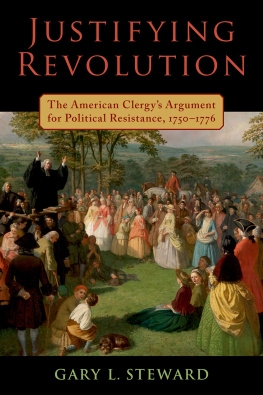
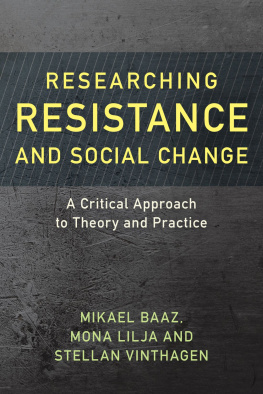
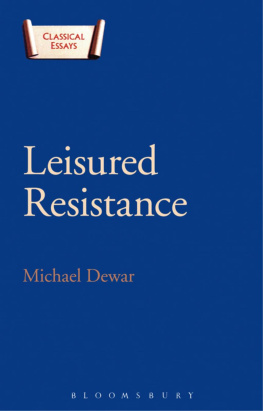

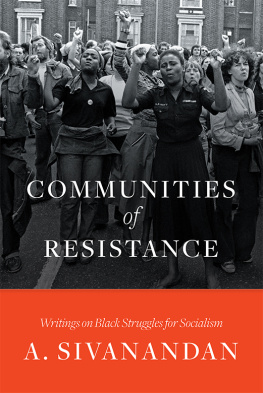
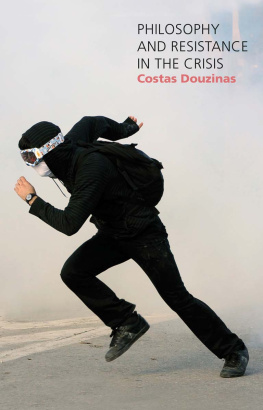
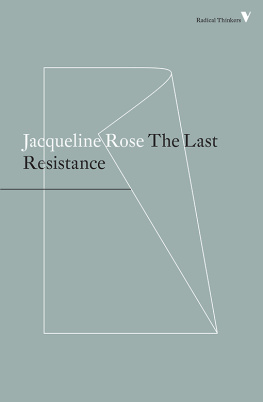
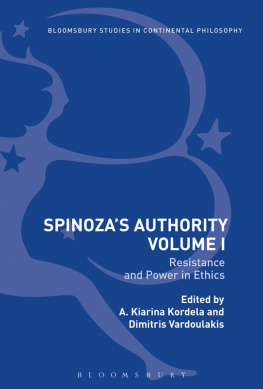

 The paper used in this publication meets the minimum requirements of American National Standard for Information SciencesPermanence of Paper for Printed Library Materials, ANSI/NISO Z39.48-1992.
The paper used in this publication meets the minimum requirements of American National Standard for Information SciencesPermanence of Paper for Printed Library Materials, ANSI/NISO Z39.48-1992.